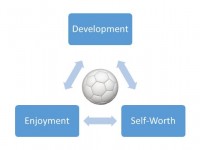#Team sports have winners & losers, & we all want to be the ones who win.
Kids In Teams recognises this is natural. The paradigm shift is to make self-worth, enjoyment & development the priority over winning. Winning is the icing on the cake.
These 10 tips define the relationship between kids in teams and the result. Follow these and the children will develop – increase their self-worth and increase their enjoyment which will help them develop and so on.
1. Some games we play it is highly likely we will win or we will lose – Sometimes experience & skill difference between teams define the result. We have to prepare with this in mind to maximize self-worth, enjoyment & development.
2. Games which we are winning easily. Make it harder. Play 3 touch, make 10 consecutive passes before scoring a goal. Do not make this obvious to the opposition. By making it harder the opposition will also benefit. We improve as well as we are forcing ourselves to compete at a higher level to earn our points.
3. Games which we are losing convincingly. Set realistic targets. Can we stop the opposition scoring for 10 minutes? Score a goal or stringing 5 passes together or improvement from the last time we played. It can be demoralizing if the opposition is piling on the goals. It is important that we use all the influence we have in this no-win situation – Never give up, play the best game we can under the circumstances.
4. Avoid discussions about winning or losing. It is better to use terms such as control the game, defend, win the ball back. Help the children focus on what they need to do. At the end of the game talk about positive things for each child.
5. The process is more important than the result. Did we play well ? Did we do the things we planned ? Did we give our best without fear of failure ? Did we have fun ?
6. Encourage the children to try without fear of failure. Congratulate them for having the courage to try. This will fast track their learning. In the short term mistakes will cost a result. Its development.
7. Inspire, Influence and Nurture. If the children see the coach has only their well-being at heart they are will give their very best.
8. Body Language. A coach with folded arms or shaking their head in disapproval can kill a child’s self-esteem which most likely will last a long time.
9. Encourage your club to create teams where the children are all of similar ability. They all have an similar ability so they all can make a difference. The coaches job becomes much easier.
10. Challenge league administrators to give greater emphasis to creating competitive leagues – thus reducing the games we cannot win and the games we cannot lose.
Kids in Teams is a journey where the destination is ever changing – it’s the getting there that is most important. Create an environment that’s fun, with no fear of making mistakes & has good role-models. This will fast-track their development.


